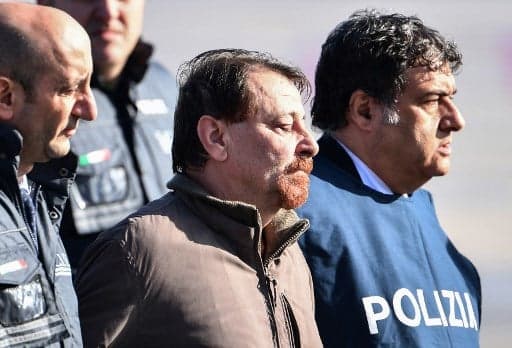Italian ex-militant Battisti admits to 1970s murders

Former communist militant Cesare Battisti, jailed for life in Italy over four murders carried out in the 1970s, has confessed to the killings after decades of denying involvement.
Battisti, 64, has admitted all the charges brought against him in four murder cases, Milan's prosecutor Alberto Nobili was quoted as saying by Italian media.
He also admitted that armed revolution was "wrong", Nobili said.
Nobili, who questioned Battisti at a high-security prison in Sardinia for nine hours over the weekend, said it had "felt like I was watching the liberation of someone who was initially embarrassed, troubled."
READ ALSO:
"I realise the bad I have done and apologise to the families," Nobili quoted Battisti as saying.
Jailed in 1979 for belonging to an armed revolutionary group outlawed in Italy, Battisti escaped from prison two years later, and had spent nearly four decades on the run.
An international police operation eventually tracked him down and arrested him in Bolivia in January.
Battisti was sentenced to life for having killed a policeman and a prison guard, for taking part in the murder of a butcher and for helping plan the slaying of a jeweller who died in a shootout that left his teenage son in a wheelchair.
Apologies 'out of place'
The murdered policeman's brother Maurizio Campagna said "apologies now seem
out of place."
"I think his lawyer is advising him so he can have his sentence lowered," Campagna told Italy's Sky TG24 television.
Battisti is serving his sentence in a Sardinian prison housing more than 250 convicts, many of them living under the tough "41-bis" prison regime usually applied to Mafia members.
Battisti confessed to the killings during questioning in prison over the weekend, Nobili said.
Following his jailbreak, Battisti had reinvented himself as an author, writing a string of noir novels. In 2004, he skipped bail in France, where he had taken refuge. He then went to live clandestinely in Brazil until he was arrested in 2007 in Rio de Janeiro.

Cesare Battisti arrives at Rome's Ciampino airport. Photo: Alberto Pizzoli/AFP
After years in custody, then-president Luiz Inacio Lula da Silva issued a decree - later upheld by Brazil's Supreme Court - in 2010 refusing Battisti's extradition to Italy, and he was freed, angering Rome.
But earlier this year, Battisti was seized without a struggle in the Bolivian city of Santa Cruz de la Sierra in an operation carried out by a joint team of Italian and Bolivian officers.
Until now, he had admitted to being part of the Armed Proletarians for Communism, a radical group that staged a string of robberies and attacks, but always denied responsibility for any deaths, painting himself as a political refugee who faced "torture and death" if he returned to Italy.
READ ALSO:
Comments
See Also
Battisti, 64, has admitted all the charges brought against him in four murder cases, Milan's prosecutor Alberto Nobili was quoted as saying by Italian media.
He also admitted that armed revolution was "wrong", Nobili said.
Nobili, who questioned Battisti at a high-security prison in Sardinia for nine hours over the weekend, said it had "felt like I was watching the liberation of someone who was initially embarrassed, troubled."
READ ALSO:
"I realise the bad I have done and apologise to the families," Nobili quoted Battisti as saying.
Jailed in 1979 for belonging to an armed revolutionary group outlawed in Italy, Battisti escaped from prison two years later, and had spent nearly four decades on the run.
An international police operation eventually tracked him down and arrested him in Bolivia in January.
Battisti was sentenced to life for having killed a policeman and a prison guard, for taking part in the murder of a butcher and for helping plan the slaying of a jeweller who died in a shootout that left his teenage son in a wheelchair.
Apologies 'out of place'
The murdered policeman's brother Maurizio Campagna said "apologies now seem
out of place."
"I think his lawyer is advising him so he can have his sentence lowered," Campagna told Italy's Sky TG24 television.
Battisti is serving his sentence in a Sardinian prison housing more than 250 convicts, many of them living under the tough "41-bis" prison regime usually applied to Mafia members.
Battisti confessed to the killings during questioning in prison over the weekend, Nobili said.
Following his jailbreak, Battisti had reinvented himself as an author, writing a string of noir novels. In 2004, he skipped bail in France, where he had taken refuge. He then went to live clandestinely in Brazil until he was arrested in 2007 in Rio de Janeiro.

Cesare Battisti arrives at Rome's Ciampino airport. Photo: Alberto Pizzoli/AFP
After years in custody, then-president Luiz Inacio Lula da Silva issued a decree - later upheld by Brazil's Supreme Court - in 2010 refusing Battisti's extradition to Italy, and he was freed, angering Rome.
But earlier this year, Battisti was seized without a struggle in the Bolivian city of Santa Cruz de la Sierra in an operation carried out by a joint team of Italian and Bolivian officers.
Until now, he had admitted to being part of the Armed Proletarians for Communism, a radical group that staged a string of robberies and attacks, but always denied responsibility for any deaths, painting himself as a political refugee who faced "torture and death" if he returned to Italy.
READ ALSO:
Join the conversation in our comments section below. Share your own views and experience and if you have a question or suggestion for our journalists then email us at [email protected].
Please keep comments civil, constructive and on topic – and make sure to read our terms of use before getting involved.
Please log in here to leave a comment.